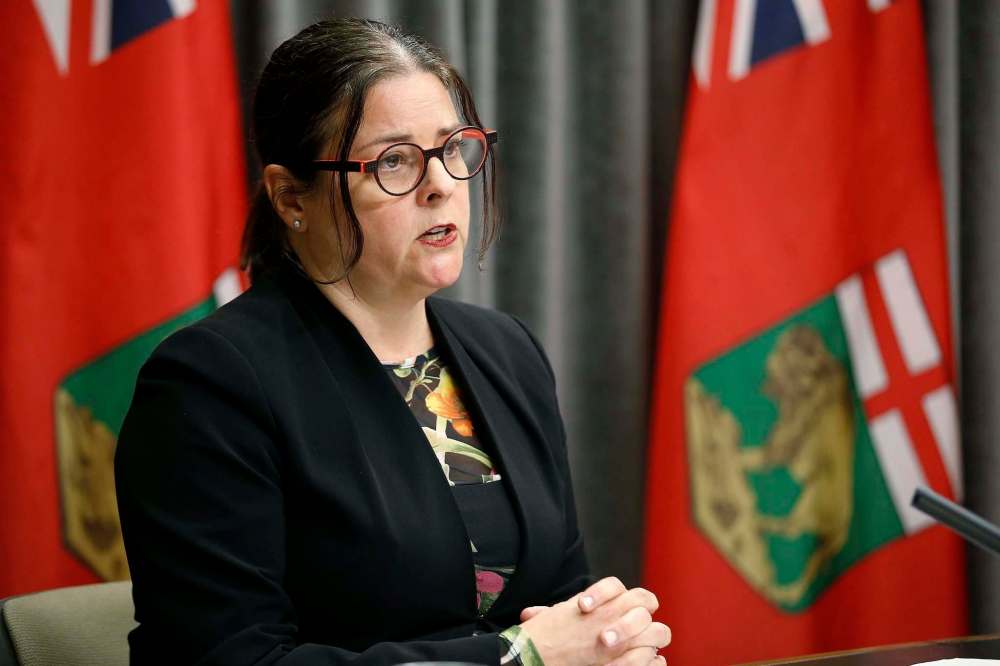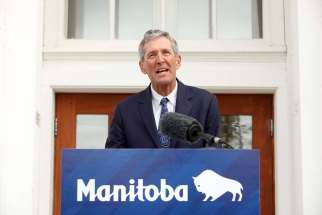Job 1 for new Tory leader: damage repair
Read this article for free:
or
Already have an account? Log in here »
To continue reading, please subscribe:
Monthly Digital Subscription
$0 for the first 4 weeks*
- Enjoy unlimited reading on winnipegfreepress.com
- Read the E-Edition, our digital replica newspaper
- Access News Break, our award-winning app
- Play interactive puzzles
*No charge for 4 weeks then price increases to the regular rate of $19.00 plus GST every four weeks. Offer available to new and qualified returning subscribers only. Cancel any time.
Monthly Digital Subscription
$4.75/week*
- Enjoy unlimited reading on winnipegfreepress.com
- Read the E-Edition, our digital replica newspaper
- Access News Break, our award-winning app
- Play interactive puzzles
*Billed as $19 plus GST every four weeks. Cancel any time.
To continue reading, please subscribe:
Add Free Press access to your Brandon Sun subscription for only an additional
$1 for the first 4 weeks*
*Your next subscription payment will increase by $1.00 and you will be charged $16.99 plus GST for four weeks. After four weeks, your payment will increase to $23.99 plus GST every four weeks.
Read unlimited articles for free today:
or
Already have an account? Log in here »
Hey there, time traveller!
This article was published 19/08/2021 (1575 days ago), so information in it may no longer be current.
Premier Brian Pallister’s announcement last week that he plans to step down as leader of Manitoba’s Progressive Conservative Party was likely music to the ears of many party faithful. The premier’s abrasive and autocratic leadership style has hurt his party’s standings in public opinion polls, with Tory support falling to 29 per cent in the most recent Probe Research survey. It’s the lowest approval rating for the party since the Pallister government was re-elected in 2019 with 47 per cent popular support.
Mr. Pallister’s departure from Manitoba politics, expected by the end of this year, would undoubtedly contribute to a reversal of that trend. A new, more appealing leader who could better connect with voters would likely have an immediate impact on the party’s popularity. However, it would not be a magic bullet. Even with a new leader, the PC Party will face significant challenges regaining the trust of Manitoba voters between now and the next provincial election, scheduled for October 2023.
The Pallister government’s less-than-stellar response to the pandemic was a major contributor to its precipitous fall in the polls. No new PC Party leader can change that, except to acknowledge that government made mistakes (an admission Mr. Pallister has been loath to make) and pledge to do better during the recovery stage of the pandemic.
What a new leader can and should do, if she or he wants to be competitive in the next election, is reassess the legislative agenda and better align it with the priorities of Manitobans. Bill 64 — proposed legislation to revamp the public school system, including eliminating most elected school boards — would be at the top of that list. It has been met with fierce and widespread opposition, including from some in traditional Tory ridings in rural parts of Manitoba.
The proposal to replace elected school trustees with appointed government boards came as a complete surprise to most Manitobans and was not reflective of the public engagement that took place over the past year on the future of public schools.
Whoever takes over from Mr. Pallister would do well to pause Bill 64, re-evaluate its contents and find a more enlightened solution to improving Manitoba’s public school system. Former health minister Heather Stefanson, who declared her candidacy for the leadership position Wednesday, said if she becomes premier she will withdraw Bill 64.

A new Tory leader should also revisit several other aspects of Mr. Pallister’s legislative agenda, including proposed changes to labour laws and the Public Utilities Board oversight of Manitoba Hydro.
One of the first actions a new PC Party leader should take is to repair the damage Mr. Pallister has caused between the provincial government and Indigenous people in Manitoba. Meaningful reconciliation cannot occur until that relationship has been repaired.
Manitoba’s PC Party does not have to completely reinvent itself. It is a fiscally conservative party that offers Manitobans an alternative to the organized-labour-backed NDP and the left-leaning Liberal party. However, it needs to put the “progressive” back into the Progressive Conservative Party if it wants to get re-elected in 2023.
Hard-right parties of the sort Mr. Pallister (who was influenced by his Canadian Alliance background as a former federal politician) has tried to create have little appeal in Manitoba. A new Tory leader has to rebrand the party as one that is more receptive to the views and values of a broader cross-section of Manitobans, particularly in Winnipeg, where provincial elections are won and lost.
If she or he can do that, the party will have a fighting chance at the polls two years from now.










